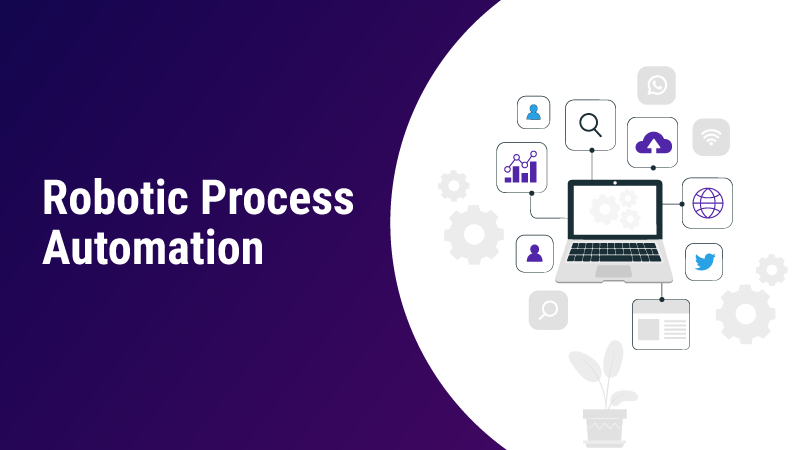Automation of Repetitive Tasks: How and Why?

Automation involves performing a task using technological tools and without human intervention. It is more like turning the ‘autopilot’ mode on so that the task will be performed without deviating from the pre-set rules and conditions. The main objective of automation is to complete repetitive and monotonous tasks so that human resources can use their time and energy to perform tasks that are more productive, valuable, and meaningful such as decision-making, collaborating team, and problem-solving. Automation not only supports the completion of tasks with perfection but also with accuracy and in minimum time. The outcome of automating a task is far better and more efficient than what the human workforce would do.
Through this article we intend to explain two relevant questions:
- How do robotic process automation solutions work across different workflows?
- Why is it important to automate repetitive tasks?
How does task automation work in different workflows?
Selecting an automation program that speeds up your business and makes your employees efficient is the first step in task automation. The success of task automation can be measured by analyzing the input given on repetitive tasks, which the employees usually spend more time on. Here are some of the areas where automation works effectively:
Marketing management
Automating the process of information dissemination and social media content development improves interaction with audiences, attracts new customers, and retains older ones. Social media automation involves scheduling the automatic publication of social media content on the estimated time or occasional republication of popular articles to gain audience attention and create a brand image. With the automation of marketing tasks, time and resources can be reallocated into other areas of marketing that require human intervention like budget-making and strategic planning. Automated tools have helped marketing companies scale their business 5 times better.
Human resources
There are many administrative tasks that come under the responsibilities of a human resource manager or the HR department. Calculating the payroll for employees, time-off requests, hiring and onboarding of new joins, and setting reminders for timesheets and employee reviews are all part of the HR activities. RPA systems with the HR department help in arranging and storing data, including employee information, scheduling meetings, recording attendance, and all other related information. RPA automation tools also help in evaluating or giving automated feedback on the performance of employees and employers, thus helping in performance improvement and coordination. Moreover, automation avoids paper waste, works according to industry regulations, and minimizes form errors.
Managerial approvals
Automation in the approval workflows makes it easier for employers and employees to work faster by streamlining workflows and storing the entire communication on a single platform. Automation tools help in converting emails and forms into records, transferring those records to databases, syncing data throughout the application, and combining data for analytics, reports, and dashboards.
Customer service
Instant responses from the other end make a customer happy. Using customer service chatbots in the workflow helps customers to get immediate responses to their queries and it also assists customers to find out the products and services they are actually looking for, in less time. Using Artificial Intelligence automation makes it easier for customer service representatives to better evaluate what a customer wants and provide them with the best quality service. Additionally, automation also allows for gathering customer feedback through online forms in order to analyze the data quickly and effectively.
Sales
Sales automation enables reducing sales costs by eliminating time spent on administration and reporting and generates extra revenue as it automates outreach to customers in the sales funnel. Besides, the possibility of losing many of the important details involved in the customer-company relationship is very high, especially when there is a mix-up of multiple sales cycles. Automation enables sales managers to manage follow-up emails and messages, update feasibility information, and organize meetings.
Order processing
When it comes to businesses, orders are what help businesses thrive in this commercial competitive world. But for dealing with all the orders, your business requires a lot of time and effort, especially when your brand grows to a recognizable level. Automation of order forms and integrating them with payments is a good solution to this problem. Automation tools help businesses to collect order forms from customers, send them to the inventory team, and give the estimated budget plan to the accounting team.
Why is it important to automate tasks?
There are many tasks that are repetitive, boring, tiring, and demand continuous human intervention. Such tasks do not allow employees to work creatively using their intelligence. They just make the employees do routine work instead of letting them focus on things that actually require human intelligence. Wouldn’t it be beneficial if all such repetitive tasks were automated? Automation goes beyond saving time and resources. Here are some of the reasons why automation is important:
Saving time and resources
One of the most important benefits of automation is that it frees up a lot of time, no matter how complex the task is. The faster you complete the task, the fewer resources you require.
Reduce errors
Since it is free from human intervention, it eliminates the chance of any possible human errors.
Reduce expenses
Automation has only a one-time charge for implementation and a maintenance charge which is quite low. Since it does not involve highly-skilled workers, there is no need to pay high wages.
Improves productivity and profit
With automation comes effective completion and functioning of tasks which in turn results in greater productivity. When productivity increases, it automatically increases the profit or revenue of the business.
Better workflow
Automation tools enable you to finish work quickly and efficiently. It avoids any delay in the overall workflow in which tasks must be completed before proceeding to the set of tasks.
Wrap Up
Automation is one of the best examples that show how our lives and work have changed with the advancement of technology. The calendar notifications we make on our mobile devices, and the auto-payment, we have enabled while paying bills are some daily examples of automation.
Now the question is about how we choose automation. Well, the answer lies in choosing the automation tools wisely as there is no shortage of choices. You can select the appropriate tool after understanding and analyzing your business requirements and available resources.
Get Started with our RPA ServicesBlogs by Category
AppForms Artificial Intelligence Blockchain Call Centers Chatbots Cloud Computing Data Management Design Digital Marketing Digital Transformation Enterprise Applications FinTech Insights LowCode Development Microsoft Mobile Apps News Office 365 Robotic Process Automation Security SharePoint Software Development Web ApplicationWhat is Robotic Process Automation? RPA Explained

2024-05-23 16:56:57